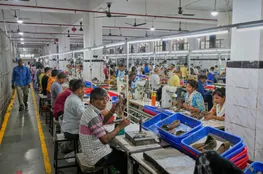Climate change is significantly impacting the world’s chocolate supply, driving up prices and emphasizing the urgency for sustainable cocoa initiatives, especially in the U.S. and Europe. Rising temperatures and increased humidity within the narrow 40-degree latitude band where cacao trees thrive are altering the growing conditions. This tropical zone is crucial as it encompasses major cocoa-producing countries like Brazil, Cameroon, Côte d’Ivoire, the Dominican Republic, Ecuador, Ghana, Indonesia, Nigeria, and Peru. Together, these regions produce about 90% of the world’s cocoa beans, yet they are particularly vulnerable to climate-induced adversities.
Cacao trees are notably sensitive to environmental changes, and extreme weather conditions disrupt their bean production, threatening farmers' livelihoods and escalating the cost of chocolate. It takes at least three years for new cacao trees to mature and start producing, making adaptation to changing climates challenging. In Côte d’Ivoire and Ghana, which account for over half of the global cocoa supply, climate change exacerbates pest issues such as the proliferation of mealybugs. These insects flourish in hotter, more humid environments, spreading the devastating swollen shoot virus that has led to the death of 200 million cacao trees, according to the National Oceanic and Atmospheric Administration.
Additionally, climate change contributes to the spread of black pod disease, a fungal infection that further harms cacao trees. The resulting supply shortages were highlighted by a United Nations Trade and Development statement indicating a surge in cocoa prices, reaching a historic $10,000 per metric tonne. From July 2022 to February 2024, cocoa prices escalated by 136% due to severe weather patterns impacting harvests for a third consecutive year.
In response, stakeholders in the U.S. and Europe are investing in sustainable cocoa initiatives to mitigate climate change effects and combat deforestation in cocoa farming. The U.S. Agency for International Development, for example, launched a project in 2023 alongside Indonesia’s government and private entities to train thousands of cocoa and coffee farmers in sustainable agroforestry. These efforts aim to restore soil health, diversify crops, and better manage climatic challenges, especially in regions struggling with declining cocoa yields.
The United States plays a significant role in the global chocolate industry, both as a major importer and exporter of chocolate products. In 2023, the U.S. imported $3.9 billion and exported $1.9 billion in chocolate and cocoa-related items. Notably, Canada, Mexico, and Vietnam are key markets for American chocolate exports. Europe, consuming substantial quantities of cocoa, is also advancing sustainable practices. Germany’s "German Initiative on Sustainable Cocoa" exemplifies these efforts, striving for 100% sustainably sourced cocoa and improving farmers’ living conditions. As of 2023, 92.2% of cocoa sweets in Germany were made sustainably.
Switzerland, through the Swiss Platform for Sustainable Cocoa, is similarly committed to sustainable cocoa. The platform aims to ensure by 2025 that 80% of Swiss cocoa imports are sustainable. These projects not only secure chocolate availability but also significantly enhance cocoa farming communities’ livelihoods. Promoting sustainable cocoa can create broader impacts, fostering economic and social benefits for smallholder farmers while addressing climate change challenges in agriculture.
























